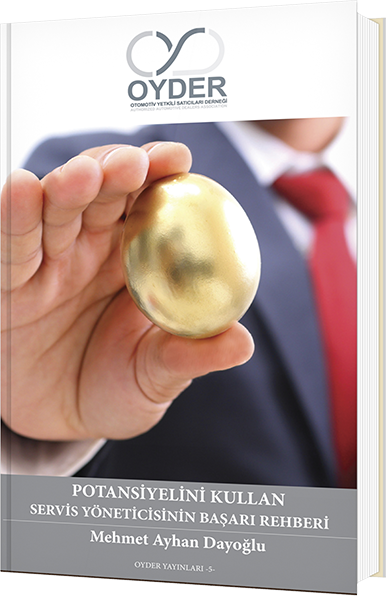Friday, 14 October 2005 22:25
Stephen R. Covey and Lions Club
Last Wednesday I attended the Çemenzar Lions Club October monthly meeting as a guest spokesman having been invited to do so by my dear friend Nejat Ulugöl. Being a spokesman is not as easy as being a guest, speaking to a crowd whose interests you know nothing about is difficult and requires preparation. As I approached the stand I remembered Stephen R. Covey, whose name I had first heard from my general manager, and began to share what I knew with the crowd.
In his book, “The 7 Habits of Highly Effective People”, Covey talks about the the change in paradigm. The change in paradigm is inevitable for those who want to develope themselves. People who want to be more influencial need to change the way they look at life and empathise with others in any situation. People who do not welcome the change in paradigm will be the ones looking in the rear view mirror while the others will be driving at speed looking ahead. People who construct their life philosophy around questions like; What should I do? How should I do it? Why should I do it? Will always be one step ahead of others because they are able to approach events with their knowledge, capability and desires.They will constantly aim to increase their effectiveness as well as maintaing a production and production capability equilibrium. Their aim is not to take all of the golden eggs from the chicken and leave it at that instead they will feed the chicken in order to maintain a constant supply of golden eggs. These type of people do not wait for others to intervene and solve the problem, they will collaborate with those around them in order to resolve the situation. They develope their characteristic traits in order to be totally independant. The 7 habits of highly effective ;
1.) Be proactive. In otherwise they take responsibilty of their lives. Proactive people recognise that they are "response-able." They don't blame genetics, circumstances, conditions, or conditioning for their behavior. They know they choose their behavior.
2.) Begin with the end in mind. It is based on the principle that all things are created twice. There is a mental (first) creation, and a physical (second) creation. The physical creation follows the mental, just as a building follows a blueprint. If you don't make a conscious effort to visualize who you are and what you want in life, then you empower other people and circumstances to shape you and your life by default. It's about connecting again with your own uniqueness and then defining the personal, moral, and ethical guidelines within which you can most happily express and fulfill.
3.) Put first things first. Habit 3 is the second creation, the physical creation. This habit is where Habits 1 and 2 come together. It happens day in and day out, moment-by-moment. It deals with many of the questions addressed in the field of time management. But that's not all it's about. Habit 3 is about life management as well--your purpose, values, roles, and priorities. What are "first things?" First things are those things you, personally, find of most worth. If you put first things first, you are organizing and managing time and events according to the personal priorities you established in Habit 2.
4.) Think win win. As a result everybody wins. Win-win is a frame of mind and heart that constantly seeks mutual benefit in all human interactions. Win-win means agreements or solutions are mutually beneficial and satisfying.
5.) Seek first to understand then to be understood. First you should understand others expectations of you and the solve the situation.
6.) Synergise. The consept is 1 + 1 = 3 or two minds are better than one. When people begin to interact together genuinely, and they're open to each other's influence, they begin to gain new insight. The capability of inventing new approaches is increased exponentially because of differences. Etkili iletişim kurarak ortak fayda yaratarak yeni ve daha iyi çözümü buluyorlar.
7.) Sharpening the saw. They know that a sharp saw can cut more trees in a short time. Sharpen the Saw means preserving and enhancing the greatest asset you have--you. It means having a balanced program for self-renewal in the four areas of your life: physical, social/emotional, mental, and spiritual.
After my speech I recieved a thank you note from Nejat and enclosed was the book, Lions Nedir? (What is Lions?). Even though it was late when I returned home I wanted to get an insight for the corporation I had just spent the evening with and found out that LIONS;
A charity that aims to increase happiness in humans and glorify them,
LIONS terms of definition instead of the word help care is used,
Members of the LIONS club aim to provide service for those worse off than themselves,
LIONS club aims to increase happiness in humans and glorify them regardless of which language, religion or race they come from,
The name LIONS means Liberty, Intelligence, Our Nations` Safety,
The slogan for the club is “We Serve”
It was morning before I realised that I had spent an evening explaining how to be effective to a group of people who already were.
1.) Be proactive. In otherwise they take responsibilty of their lives. Proactive people recognise that they are "response-able." They don't blame genetics, circumstances, conditions, or conditioning for their behavior. They know they choose their behavior.
2.) Begin with the end in mind. It is based on the principle that all things are created twice. There is a mental (first) creation, and a physical (second) creation. The physical creation follows the mental, just as a building follows a blueprint. If you don't make a conscious effort to visualize who you are and what you want in life, then you empower other people and circumstances to shape you and your life by default. It's about connecting again with your own uniqueness and then defining the personal, moral, and ethical guidelines within which you can most happily express and fulfill.
3.) Put first things first. Habit 3 is the second creation, the physical creation. This habit is where Habits 1 and 2 come together. It happens day in and day out, moment-by-moment. It deals with many of the questions addressed in the field of time management. But that's not all it's about. Habit 3 is about life management as well--your purpose, values, roles, and priorities. What are "first things?" First things are those things you, personally, find of most worth. If you put first things first, you are organizing and managing time and events according to the personal priorities you established in Habit 2.
4.) Think win win. As a result everybody wins. Win-win is a frame of mind and heart that constantly seeks mutual benefit in all human interactions. Win-win means agreements or solutions are mutually beneficial and satisfying.
5.) Seek first to understand then to be understood. First you should understand others expectations of you and the solve the situation.
6.) Synergise. The consept is 1 + 1 = 3 or two minds are better than one. When people begin to interact together genuinely, and they're open to each other's influence, they begin to gain new insight. The capability of inventing new approaches is increased exponentially because of differences. Etkili iletişim kurarak ortak fayda yaratarak yeni ve daha iyi çözümü buluyorlar.
7.) Sharpening the saw. They know that a sharp saw can cut more trees in a short time. Sharpen the Saw means preserving and enhancing the greatest asset you have--you. It means having a balanced program for self-renewal in the four areas of your life: physical, social/emotional, mental, and spiritual.
After my speech I recieved a thank you note from Nejat and enclosed was the book, Lions Nedir? (What is Lions?). Even though it was late when I returned home I wanted to get an insight for the corporation I had just spent the evening with and found out that LIONS;
A charity that aims to increase happiness in humans and glorify them,
LIONS terms of definition instead of the word help care is used,
Members of the LIONS club aim to provide service for those worse off than themselves,
LIONS club aims to increase happiness in humans and glorify them regardless of which language, religion or race they come from,
The name LIONS means Liberty, Intelligence, Our Nations` Safety,
The slogan for the club is “We Serve”
It was morning before I realised that I had spent an evening explaining how to be effective to a group of people who already were.
















